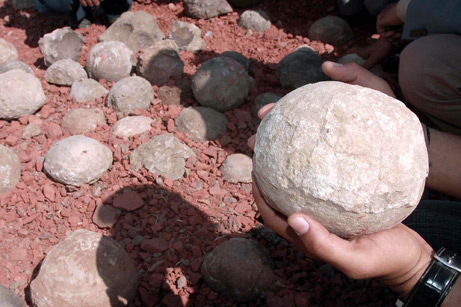| |
India's Jurassic nest dug - Hundreds of dinosaur eggs in India |
|
Source : http://timesofindia.indiatimes.com/news/india/Indias-Jurassic-nest-dug-up-in-Tamil-Nadu/articleshow/5073985.cms
 |
Geologists in southern India say they have found hundreds of dinosaur egg clusters which could be about 65 million years old. It was a chance find discovered when a team of scientists were locating a place to excavate an ancient riverbed in the state of Tamil Nadu.
As they dug deeper they saw layers of what looked like fossilised eggs.The photos and samples were then sent to various universities who confirmed that they were dinosaur eggs. Each egg is the size of a football - about 13 to 23cm in diameter, lying buried in sandy nests. The leader of the team, MU Ramkumar, told the BBC the finding is significant and could help to unravel the mystery about the extinction of dinosaurs.
Researchers from the Salem-based Periyar University found clusters of eggs of what they believe to be the most aggressive Carnosaur and the docile, leaf-eating Sauropod at Sendurai village.While Carnosaurs were large predatory dinasaurs, Sauropods were long-necked, herbivores which grew to enormous heights and sizes.
|
'Infertile'
"The important finding is that these eggs have been found in different layers that means the dinosaurs came to the place over and over year after year," he said. "The second important thing is that we have got volcanic ash deposits on the eggs which suggests that volcanic activity could have caused their extinction. "The other thing we have found is that all these eggs are unhatched and infertile. So what made the eggs infertile? We need to carry out further studies to learn more from the findings."
Scientists believe the eggs belong to the docile leaf-eating Sauropod branch of dinosaurs. Their remains have been dug up on every continent, including Antarctica. Palaeontologists use the term to describe large, four-legged, plant-eating dinosaurs with bulky bodies, long necks and tails and tiny heads with relatively small brains. Dr Ramkumar and his team have called on the central and state governments to protect what they are calling a "Jurassic treasure trove".
The presence of dinosaur eggs was first recorded in the same district by a British geologist in the 1860s. In the 1990s a dinosaur egg was found in a government-owned factory in the state. That dinosaurs once roamed the area was known from the fossils found there on earlier expeditions. But this is the first time that hundreds of nests embedded with hundreds of clusters of dinosaur eggs have been unearthed in the district.
Located on the highway between Chennai and Tiruchi, the Ariyalur and the neighbouring Perambalur geological sites nestle in the northern plains of the Cauvery river. The place is a veritable museum of ancient organisms, dating back to 140 million years. Ever since a British couple -- the Wines -- collected 32 boxes of "strange stone objects" in 1843, the Ariyalur region has drawn geologists from across the world for its rich fossil presence and diversity.
Scientists have found the tiniest marine algae or the nano fossils besides the rare shell-like bivalve, gastropoda, telecypoda and brachiopoda in the geological sites spread across 950sqkm in Ariyalur and Perambalur districts.
"We found clusters and clusters of spherical eggs of dinosaurs. And each cluster contained eight eggs," says Dr M U Ramkumar, geology lecturer of the Periyar University. Each egg was about 13 to 20 cm in diameter and they were lying in sandy nests which were of the size of 1.25 metres.
In the 1860s, a British geologist first recorded the presence of bone remains of dinosaurs in Ariyalur. Over a century and a half later, the egg of a dinosaur was found in a cement factory of the state-owned Tamil Nadu Cements Ltd in 1990s. But officials realized that it was a dinosaur egg only 10 years later.
On a sultry afternoon on September 12 this year, Ramkumar and his research students went to Ariyalur to scour the rocks and sediments as part of a study funded by Indian and German scientific institutions. As they paused by a stream on a grazing land at Sendurai, they found spherical-shaped fossils peeping out of the sand beds. "We got really excited. As I have seen a dinosaur egg, I was sure these were dinosaur eggs," said Ramkumar.
A quick digging revealed clusters of eggs beneath seven layers of sand spread over two sqkm. The eggs may not have hatched due to the Deccan volcanic eruptions or seasonal flooding, surmise the team. "We suspect the extinction of dinosaurs was triggered by the Deccan volcano. Volcanic ashes cap the eggs," said one researcher.
"This is a very significant finding as never before have we found so many dinosaur eggs in the country. Besides the spherical size of the eggs covered with sand and volcanic ash provide significant insight into the possible reasons for extinction of the species," says Dr Jyotsana Rai, senior scientist, Birbal Sahni Institute of Paleobotany in Lucknow. Her team will collect samples of these eggs to determine its exact age.
Because a similar discovery in Jabalpur led to a plunder of the fossilized treasure, the researchers have requested the Ariyalur district administration to cordon off the site. Samples of the eggs will travel to Germany for further research. The vicinity of Jabalpur in Madhya Pradesh is considered the richest dinosaur field in the country.
Liked it ? Want to share it ? Social Bookmarking
Discuss article |
Article Link
|
More unsolved mysteries on Unexplained Mysteries
|






